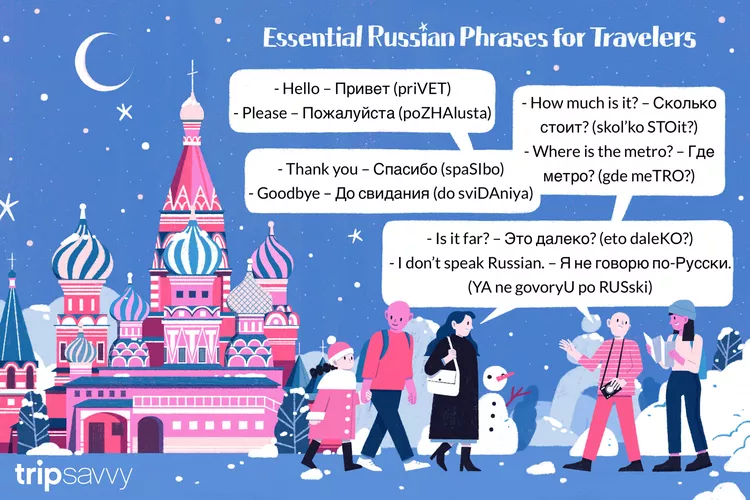Summary of Essential Russian Phrases for Travelers
In Russia’s major cities, many people (especially younger Russians and those working in customer service professions) speak English. However, it’s still likely that you will find yourself in a situation where the person you’re communicating with doesn’t know any English. This is especially true when traveling outside the big cities or off the beaten path. Therefore, having a brief vocabulary guide can significantly enhance your experience and help you connect with Russian culture during your travels.
Important Notes
If you don’t know the right word, don’t panic! The Russian language can be challenging to remember and pronounce. Focus on a few key phrases and try to memorize them as best as you can. Most Russians will understand you even if you have a strong accent.
Below you’ll find both formal and informal versions of phrases. In Russia, it’s customary to address someone you don’t know with formal language, particularly if they are older than you or during any customer service or public official interactions. Keep these rules in mind:
- The stressed syllable is indicated by capital letters. For example, in the word “PoZHAlusta” (please), the stress is on the second syllable.
- The Russian “e” sounds more like the “e” at the end of the sound “ye”; it is not pronounced like in the English words “met” or “meet.”
- The Russian “g” is always hard (as in “garden,” not in “vegetable”).
- If you see the symbol [‘] after a word, it indicates that you should soften the last consonant as if you were going to add the letter “i” at the end but stop just short of doing so. For example, with “den’,” imagine you were about to say “deni” but don’t pronounce the “i” sound. This is not crucial for beginners; you will likely be understood regardless.
Essential Russian Phrases
- Yes – Да (da)
- No – Нет (nyet)
- Please – Пожалуйста (poZHAlusta)
- Thank you – Спасибо (spaSIbo)
- You’re welcome. – Не за что. (ne za chto)
- Enjoy (often used instead of “you’re welcome” for food) – на здоровье (na zdaROVye)
- I’m sorry. – Прошу прощения. (proSHU proSHCHEniya)
- Excuse me. – Извините. (izviNIte)
- I don’t understand. – Я не понимаю. (YA ne poniMAyu)
- I don’t speak Russian. – Я не говорю по-Русски. (YA ne govoryU po RUSski)
- Do you speak English? – вы говорите по-Английски? (vi govoRIte po angLIYski?)
- Help me, please. – Помогите, пожалуйста. (pomoGIte, poZHAlusta)
- Where is the bathroom? – Где туалет? (gde tuaLET?)
- One ticket, please. – Один билет, пожалуйста. (oDIN biLYET, poZHAlusta)
Greetings and Small Talk
- Hello (formal) – Здравствуйте (ZDRAstvuyte)
- Hello (informal) – Привет (priVET)
- Good morning. – Доброе утро. (dObroye Utro)
- Good afternoon. – Добрый день. (dObriy den’)
- Good evening. – Добрый вечер. (dObriy VEcher)
- How are you? – Как дела? (kak deLA?)
- I’m fine, thank you. – Хорошо, спасибо. (haraSHO, spaSIbo)
- I’m OK, thank you. – Неплохо, спасибо. (nePLOho, spaSIbo)
- What’s your (formal/informal) name? – Как вас/тебя зовут? (kak vas/teBYA zoVUT?)
- My name is… – Меня зовут… (meNYA zoVUT…)
- It’s nice to meet you. – Приятно познакомиться. (priYATno poznaKOmitsa)
- Goodbye. – До свидания. (do sviDAniya)
- Good night. – Доброй ночи. (DObroi NOchi)
- Until next time – До встречи (do VSTREchi)
Directions
- Where is…? – Где …? (Gde…?)
- Where is the metro? – Где метро? (gde meTRO?)
- Where is the bus? – Где автобус? (gde avTObus?)
- Is it far? – Это далеко? (eto daleKO?)
- Go straight. – Идите прямо. (iDIte PRYAmo)
- Turn right. – Поверните на право. (poverNIte na PRAvo)
- Turn left. – Поверните на лево. (poverNIte na LEvo)
- Stop here, please. – Остановитесь здесь, пожалуйста. (ostanoVItes’ zdes’, poZHAlusta)
- A map, please. – Карту, пожалуйста. (KARtu, poZHAlusta)
Eating Out
- Could I have the menu, please? – Можно меню, пожалуйста? (MOzhno meNU poZHAlusta?)
- A table for two, please. – На двоих, пожалуйста (na dvoIH, poZHAlusta)
- Appetizer – Закуска (zaKUSka)
- Salad – Салат (saLAt)
- Soup – Суп (sup)
- Chicken – Курица (KUritsa)
- Beef – Говядина (goVYAdina)
- Fish – Рыба (RIba)
- Main course – Горячее Блюдо (goRYAchee BLUdo)
- Dessert – Десерт (deSSERt)
- I will have… – Я буду… (ya BUdu…)
- May I have a glass of… (water/wine/beer) – Можно мне стакан… (вина/воды/пива) (MOzhno mne staKAN… [viNA/voDI/PIv])
- May I have a cup of… (tea/coffee) – Можно мне чашку… (чая/кофе) (MOzhno mne CHAshku… [CHAya/KOfe])
- Do you have something vegetarian? – У вас есть вегетарианские блюда? (u vas est’ vegetariANskiye BLUda?)
- May I have the bill, please? – Можно чек, пожалуйста? (MOzhno chek, poZHAlusta?)
- Breakfast – Завтрак (ZAvtrak)
- Lunch – Обед (oBED)
- Dinner – Ужин (Uzhin)
Shopping
- How much is it? – Сколько стоит? (skol’ko STOit?)
- Can I pay? – Можно заплатить? (MOzhno zaplaTIT’?)
- Can I pay by credit card? – Можно заплатить кредитной карточкой? (MOzhno zaplaTIT’ kreDItnoi KARtochkoi?)
- Cash – Наличные (naLICHnie)
- Bookstore – Книжный магазин (KNIzhni magaZIN)
- Supermarket – Супермаркет (superMARket)
- Bakery – Булочная (BUlochnaya)
Time Indications
- Now – Сейчас (seyCHAS)
- Today – Сегодня (seGOdnya)
- Tomorrow – Завтра (ZAVtra)
- Yesterday – Вчера (vcheRA)
- Morning – Утро (Utro)
- Afternoon – День (den’)
- Evening – Вечер (VEcher)
- This afternoon – Сегодня днем (seGOdnya dnyom)
- This evening – Сегодня вечером (soGOdnya VEcherom)





